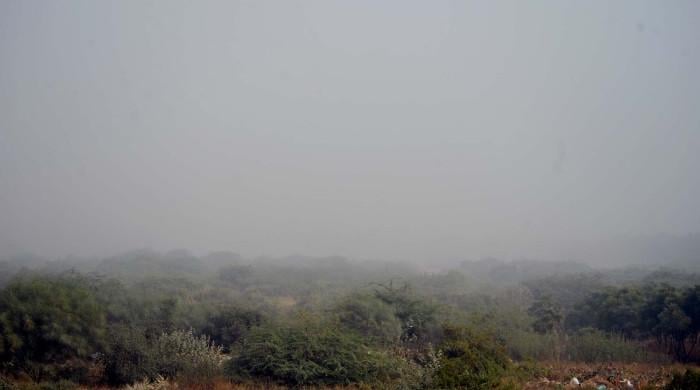Guterres renews fund appeal for Pakistan, says UN's efforts 'drop in ocean'
"You can absolutely be sure about one thing: were are in total solidarity with the Pakistani people," UN chief says
September 10, 2022

- UNSG Guterres says in "total solidarity" with Pakistani people.
- He asks international community to ensure they help Pakistan.
- Pakistan needs at least $10 billion to repair damaged infrastructure.
SUKKUR: United Nations Secretary-General Antonio Guterres on Saturday visited flood-affected areas in Sindh, stressing the need for developed nations to assist Pakistan as the international body's help is "a drop in the ocean" compared to what is needed to rebuild.
Nearly 1,400 people have died in flooding that covers a third of the country — an area the size of the United Kingdom — wiping out crops and destroying homes, businesses, roads, and bridges.
Guterres hopes his visit will galvanise support for Pakistan, which needs at least $10 billion to repair damaged infrastructure.
The UNSG, in a conversation with journalists in Sukkur, said that there needs to be a serious discussion on loss and damages as "what the UN is doing in Pakistan is a drop in the ocean of what is needed".
"We are perfectly aware of our limited capacity and our resources. But you can absolutely be sure about one thing: were are in total solidarity with the Pakistani people."
The UN chief said that he will ask the international community to ensure that they help Pakistan "now" while vowing to raise awareness about the disastrous situation.
Pakistan receives heavy — often destructive — rains during its annual monsoon season, which is crucial for agriculture and water supplies.
But downpours as intense as this year's have not been seen for decades.
“It is not a matter of generosity, but a matter of justice,” he said, reiterating the UN’s commitment, strong support and solidarity with the flood-affected populace of Pakistan.
Guterres said that huge damages and losses were caused by the floods to human lives and properties.
He stressed that the international community must realise the serious impacts of greenhouse emissions as nature was striking back in the form of natural calamities.
Greenhouse gases have accelerated climate change and the nations with larger greenhouse emission footprints must understand these issues, Guterres added.
‘Pakistan paying price of something created by others’
Speaking to journalists, alongside Foreign Minister Bilawal Bhutto-Zardari and Chief Minister Sindh Murad Ali Shah in Karachi, Guterres said: “We have declared war on nature and thus we see here in Pakistan that nature is striking back with devastating consequences.”
The UNSG said that he had seen many humanitarian disasters in the world but “have never seen climate carnage on this scale.”
“I have simply no words to describe what I have seen today,” he said after his tour of flood-affected areas in Sindh and Balochistan.

He highlighted that the flood-hit area [in Pakistan] is three times the total area of his country — Portugal.
Guterres mentioned that the needs are enormous, therefore he urged “massive and urgent financial support” for Pakistan.
“This is not just the question of solidarity or generosity it is a question of justice Pakistan is paying the price of something that was created by others,” he maintained.
Country slashes GDP projection
Pakistan expects to cut its GDP growth projection for the financial year 2022-2023 to 3% from 5% due to the losses, planning minister Ahsan Iqbal told an earlier news conference.
The United Nations has already launched an appeal for $160 million in aid to help Pakistan cope with the disaster.
In a tweet earlier, the UNSG said developing nations were paying a "horrific price" for the world's reliance on fossil fuels.
"Pakistan and other developing countries are paying a horrific price for the intransigence of big emitters that continue to bet on fossil fuels," Guterres said.
"From Islamabad, I am issuing a global appeal: Stop the madness. Invest in renewable energy now. End the war with nature."
'Insanity and suicide'
On Friday, Guterres lamented the lack of attention the world gave to climate change — particularly the industrialised nations that scientists blame.
"This is insanity, this is collective suicide," he said.
Pakistan is responsible for less than 1% of global greenhouse gas emissions, but is eighth on a list compiled by the NGO Germanwatch of countries most vulnerable to extreme weather caused by climate change.
Guterres is touring flood-hit parts of the south on Saturday, and will also visit Mohenjo-daro, a centuries-old UNESCO-designated world heritage site threatened by the deluge.
Some 33 million people have been affected by the floods, which have destroyed around two million homes and business premises, washed away 7,000 kilometres (4,500 miles) of roads and collapsed 500 bridges.
The effect of the torrential rain has been twofold — destructive flash floods in rivers in the mountainous north, and a slow accumulation of water in the southern plains.
"If he comes and sees us, Allah will bless him," Rozina Solangi, a 30-year-old housewife from a flooded village near Sukkur, told AFP Friday.
"All the children, men and women are roasting in this scorching heat. We have nothing to eat, there is no roof on our heads. So he must do something for us poor."
The meteorological office says Pakistan received five times more rain than normal in 2022. Padidan, a small town in Sindh province, has been drenched by more than 1.8 metres (71 inches) since the monsoon began in June.
Thousands of temporary campsites have mushroomed on slivers of dry land in the south and west — often roads and railway tracks are the only ground in a landscape of water.
With people and livestock cramped together, the camps are ripe for outbreaks of disease, with many cases of mosquito-borne dengue reported, as well as scabies.
— Additional input form Reuters and AFP









